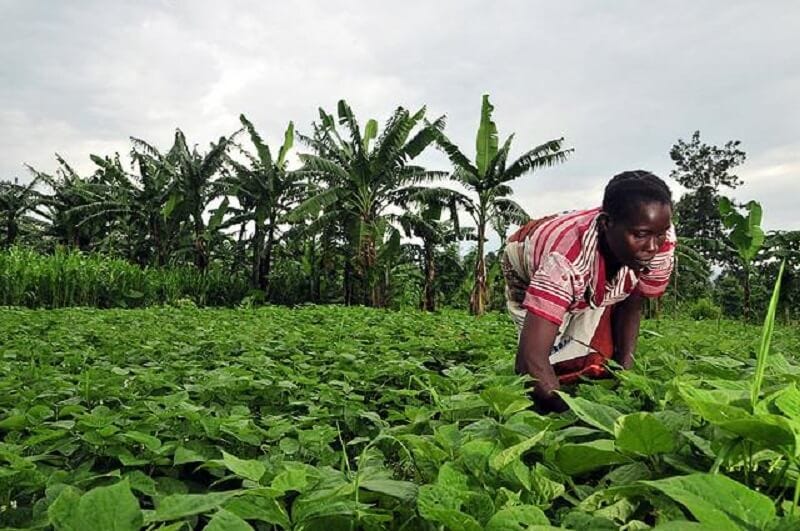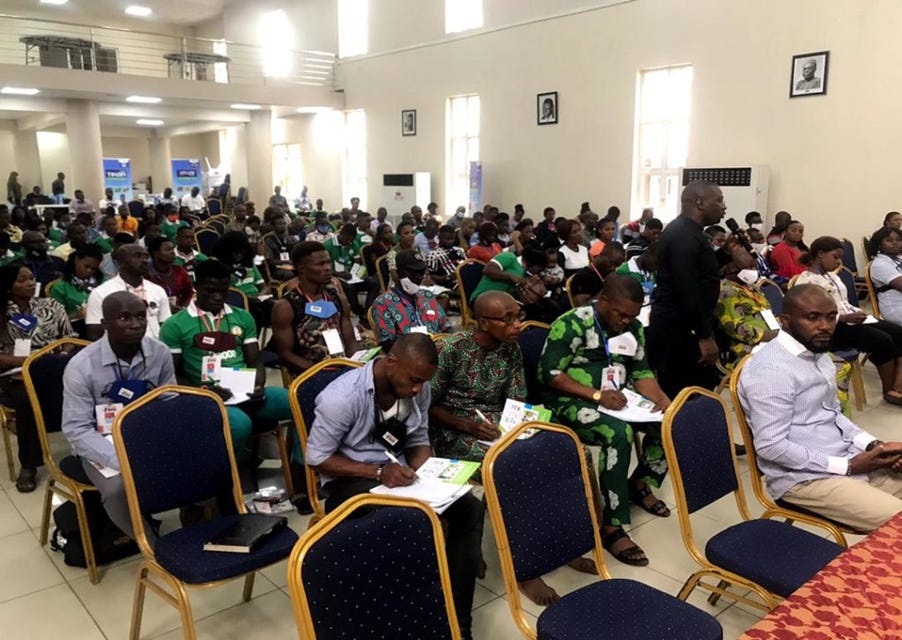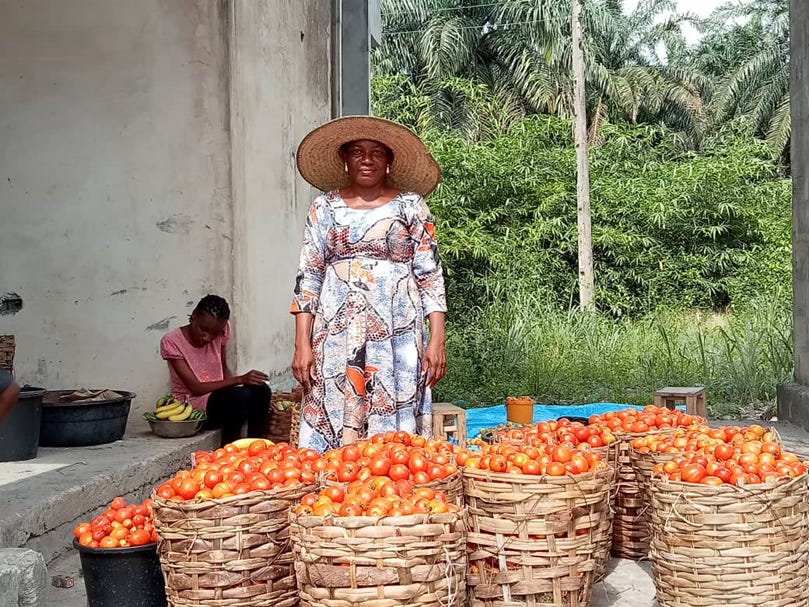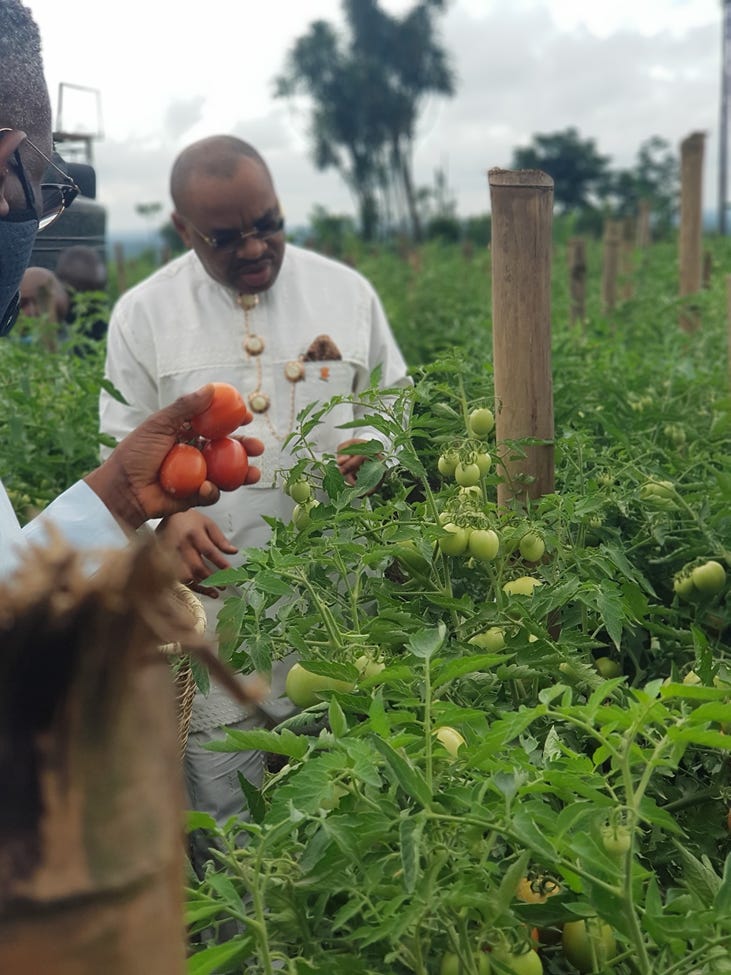How Akwa Ibom Farmers Are Challenging Northern Nigeria’s Food Production Dominance (Part 1)

Only a decade ago, no one would have imagined that onions, cucumbers, tomatoes, peppers, watermelons, and other crops grown primarily in Northern Nigeria could thrive in Akwa Ibom State.
At the time, farmers in the oil-rich state only cultivated crops like cassava, yam, maize, okra, and a few others for their own consumption, with only a small portion being sold to supplement their income.
Today, the situation has changed and Akwa Ibom farmers are bridging the supply gap of some essential vegetables which were largely brought to the state from Northern Nigeria.
Farmers, agriculture experts, and relevant state officials all agree that Akwa Ibom produces roughly 70 percent of the vegetables sold and consumed in the state and in neighboring Abia, Rivers, and Bayelsa states.
Despite the challenge of the land tenure system, many farmers in the state are no longer content with doing subsistence farming and shifting cultivation.
They are now adopting technology and improved seedlings to increase their production capacity, make more money and push hard to become one of the country’s major food baskets.
According to the most recent statistics gathered from farmers, experts, and the state agriculture ministry, Akwa Ibom is home to thousands of commercial farmers operating in over 100 registered corporative clusters along the agriculture value chain.

Our findings also show that so many farmers operate independently and contribute significantly to the state’s burgeoning food crop industry.
These include big-time farmers with large acreages of farmland in multiple locations, such as Vika Farms, Jacaja Integrated Farms, Catholic Farms, Top Faith Farms, etc.
Beyond the big-time farmers, we discovered that an increasing number of university graduates and school leavers are entering commercial farming, with many undergoing apprenticeships with some of the big farmers in the state.
Many years ago, it was considered very condescending and indeed a sign of failure for a graduate and even a secondary school leaver to take up farming as a career.
Even graduates of agriculture, crop science, and allied courses would not consider any job associated with the farm but would rather prefer low-paying white-collar jobs.
For instance, the Managing Director, of Farmcraft Limited, Aniefiok Sunday, was doing well in Lagos in his former business before he decided to venture into commercial agriculture.
“When I told my relations and friends that I wanted to go into full-time farming, they thought something was wrong with me,” he told our correspondent.
“Some of my siblings went into prayer and my friends did all they could to persuade me to drop the idea but I kept to it and moved back to Uyo, got an office, bought project vehicles and we started. They had no choice but to allow me. Today, all of them believe I took the right decision because of the progress we have made and where were are going.”

Mr. Sunday is not the only person who has to deal with stigma because he gave up his degree certificate to start a farming business; many others, particularly in Southern Nigeria, have faced even worse situations from family members and friends who think they have gone insane.
The stigmatization of farmers, however, does not seem to be limited to Nigeria as many Africans have the tendency to view farming as a demeaning occupation, especially for educated people.
In 2012, this reporter was investigating the cause of a near-epidemic of suicide in Ghana when he came across a man who nearly killed himself after his father mocked him for working on a farm after completing higher secondary school.
“It all started after I finished secondary school in Accra and went back home to the Northern region. I thought it was wise for me to support my family. I was always on the farm and I made sure we never lacked food. I also wished to make enough money from the farm to further my education. But in spite of my good intentions, my father never saw anything good about me,” the young man who gave his name as Stanley had told this reporter.
While the young man was working himself silly in a sincere attempt at feeding the large family, he was constantly insulted, mocked, and cursed by his father.
“What are you doing in the village when your mates are doing well in the cities and sending good money to their parents at home? You said you went to school but you sleep in the bush like any other boy in the village who never stepped into a school. I am disappointed in you. You are a failure and I wish I never gave birth to a son like you,” the father had told him.
The article, published by Premium Times on August 20, 2012, highlighted the various factors that lead to people becoming so depressed that they choose suicide.
However, becoming a farmer no longer carries such a stigma because hunger has taught everyone some hard lessons since COVID-19, prompting many, particularly young Nigerians, to embrace it now.
Bridging the North’s vegetable cultivation and supply gap
Before the attacks, Benue, Plateau, Nasarawa, Niger, Taraba, Kogi, and Kaduna, among other Northern states, grew the majority of vegetables and other food crops for local consumption and export.
However, over the last eight years, the number of attacks and counter-attacks, cattle rustling, and killings have significantly increased, resulting in large-scale destruction of farms, displacement of farmers and farming communities, and loss of agricultural spaces and inputs.
Because many farmers in the affected states have been thrown out of business, the quantity of vegetables and other food crops available in the North has been severely reduced while prices have gone off the roof.
The resulting scarcity and price increase on common vegetables in the North highlights the important role that Akwa Ibom farmers are now playing in the nation’s drive for food security.
According to Mr. Ebong, while fresh tomatoes harvested in the state cost between N11,000 and N13,000 per 25-kilogram basket, the same basket brought in from the North costs N15,000.
In the same vein, he said a bunch of fresh spring onions consisting of six onion stands go for only N70, whereas the same bunch from the North goes for N110.
Similarly, a 50kg bag of cucumber sells for between N5,000 to N6, 000 and because of oversupply and better quality, the species brought in from Northern Nigeria are no longer being patronized leading to a complete halt in supply.
“Our vegetables are fresh and chemical free. For instance, we don’t spray chemicals on tomatoes to get them to ripe, unlike farmers in the North. Here, our tomatoes are allowed to ripen on their own before we harvest them.
“In fact, as we harvest, the women who buy them are waiting in the farm to get them straight to the market here in Uyo and some are taken to Rivers, Abia, and other states,” Mr. Ebong told our correspondent.
Many of those who spoke with our correspondent confirmed that the quality of vegetables grown in the state is superior to those purchased from the north.
Ime Ubon, President of the Akwa Ibom State Tomato Sellers Association, told our correspondent that the tomatoes grown in the state are of higher quality and have a longer shelf life than those supplied from the northern part of the country.
“Farmers from Akwa Ibom now supply a larger quantity of tomatoes being sold within and outside the state. From my experience, the tomatoes planted here can last for between six days to one week whereas the one we buy from the North can only last between three to four days at most.
“I go directly to the farms and buy off from the farmers and take it to the market. It is a good development that some of these vegetables are now being cultivated here. It makes it easier for us but they should do more to ensure that we have enough for our customers,” said Mrs. Ubon.
Inimfon Patrick, an agricultural economist, has been in the vegetable cultivation business since 2018 after one of her students conducted research that demonstrated that vegetables could grow in the state and yield high returns on investment.
Mrs. Patrick, who has a Ph.D. in Agricultural Economics and teaches at the Akwa Ibom State University, is currently operating a three-hectare farm in Uwa-East, Essien Udim Local Government Area.
When she first started, she only cultivated cucumbers, but the yield and sales were so good that she decided to try tomatoes as well.
It was positively shocking, however, when she discovered that the profit she made in one month during harvest was equal to her annual salary and benefits as a university lecturer.
“I am a lecturer at the university but I made my annual salary in one month from planting tomatoes. Before now, we were planting in batches but currently, we are growing tomatoes in the entire three-hectare farmland.
“This year, we have planted five tins of cobra, a high-yielding tomato variety. A tin of it will give me a minimum of 12, 000 stands and when you multiply that with the number we have cultivated, you will realise that it is a huge investment.
“The state government has recognized what we are doing and they regularly sent extension officers to check on what we are doing and help us where necessary. Personally, I have trained a lot of people in the tomato business and all of them are doing very well.
“In spite of the successes recorded, she said predator birds have given tomato farmers in the state huge concern, adding that as soon as the crops start ripening, the birds would flock to the farm to eat them,” Mrs. Patrick said.
She added that she has never lost a single basket of tomatoes due to a lack of customers, saying that traders come from far and wide to buy off her harvests.
“My tomato has a longer shelf life than the one coming from the north. When we harvest cobra, it can stay for close to three weeks but we pick them just as they start ripening so birds won’t eat them up. Since the birds are picking only the ripe ones we harvest the semi-ripe to keep in the house.
“At the peak of our harvest, there was a day we harvested 71 baskets of tomatoes with each weighing 26 kg and we sold everything the same day,” said Mrs. Patrick.

How Akwa Ibom became a big vegetable farm
About a year into his first term, Governor Udom Emmanuel created the Akwa Ibom Enterprise and Employment Scheme (AKEES).
As the Senior Special Adviser to the Governor on Technical Matters and Due Process, Ufot Ebong was tasked with overseeing the AKEES interventions.
The core mandate of AKEES is to move young unemployed people from the streets and get them into gainful employment.
But Mr. Ebong is not only an appointee of the government. He is also a large-scale commercial farmer with over 20 permanent staff and scores of casual workers and trainees.
Speaking about AKEES intervention, Mr. Ebong said:
“We explored several ways including small and medium scale enterprises and sent so many young people to learn vocations. Being an agrarian society, we had thought that we could also get our young people into agriculture as a business. We looked at some of he crops that can grow here like oil palm tree, cocoa, rubber. But we realised that that level of agriculture cannot take people off the streets immediately because of the long gestation period.
We thought of the essential crops that we used to get from the Northern states like tomatoes, cabbage, onions, cucumber and others. The governor gave us money and we experimented with 22 common vegetables we import in large quantity from the Northern state and we realised that all of them were doing well here. And that was how many in the state knew they could cultivate some of the vegetables that were only brought into the state from Northern Nigeria.”

“Everybody knows that we were not cultivating cucumber in Akwa Ibom. We were parking in Odukpani when returning from Calabar to buy cucumber. But now, we are sending cucumber to neighbouring states like Rivers and Abia. When we started, people were not willing to buy. They said, ‘how can cucumber grow here.’ Today, they have found out that the specie we have is the best and we are not using chemicals to plant it.
“We went into tomatoes cultivation and I can tell you that the one we have here is one of the best because it saved us during the security crisis in the North. Now we have devised a means of bridging the gap in production and supply. When the Northerners are planting, that’s when we are harvesting and we can plant all round the year. That is why Akwa Ibom is now almost self-sufficient in cabbage, cucumber, tomatoes, assorted species of pepper, onions, etc. We send our spring onions to Port Harcourt every week.”
To ensure that farmers acquired the requisite skill to succeed in vegetable cultivation, the government not only mounted training for them but also encourage ensured that they got the right inputs to startup.
According to findings, the government had trained about 400 young people through the AKEES initiative who are now working as farmers full-time, creating thousands of jobs in the process.
Langwa Brezhnev, an agriculture development consultant and the managing director of Benny Fruits and Vegetables Nigeria Limited, was responsible for training the farmers and introducing them to new seed varieties being grown in the state.

Mr. Brezhnev described how the vegetable revolution began, saying, “I have been in the business of cultivating vegetables and fruits for export since 2013.” Vegetable cultivation was never practiced in Akwa Ibom. Until now, Northern Nigeria supplied the majority of the vegetables consumed here.
“We needed to train farmers here, especially young people on how to cultivate some of the common vegetables and that was how Beny Academy came in. Through Beny Academy, we have been partnering with the Government of Akwa Ibom State and the Federal Government to train Akwa Ibom people and get them into gainful activities. You now have cucumbers, tomatoes, and pepper all cultivated in Akwa Ibom.”
Mr. Brezhnev disputed the notion that pepper, cucumber, carrot, watermelon, onion, cabbage, and other essential vegetables can only grow in Northern Nigeria, claiming that Akwa Ibom soil can increase crops all year.
“Let me shock you, these vegetables can grow in Akwa Ibom from January to December but they cannot grow in Northern Nigeria in the same way. Vegetables are not cultivated in Northern Nigeria from April to September because of the rains.
“They are cultivated from October to March. But in Akwa Ibom State, you can cultivate tomatoes and cucumber from January to December. Nobody tried it before. People just believed it was impossible to grow them here.
“I am from Wotutu, Limbe in Cameroon and the temperature in Akwa Ibom is not different from what we have in at home. So, I felt that if we could plant tomatoes and other vegetables in Wotutu, there’s no reason we can’t we grow them in Akwa Ibom.”
While tomatoes mature in Akwa Ibom in less than 70 days, Mr. Brezhnev said it takes longer to mature in Wotutu, a farming community on the outskirts of Limbe, a seaside town in Cameroon’s south-west region.
He maintains that vegetables grown in the state are not only used in Akwa Ibom but are also sold in Cross River, Abia, and Rivers states, saving the region billions of naira in transportation costs from the north.
How the state government is promoting food security and sustainability
But it was Agriculture Commissioner Offiong Offor and his counterpart in the Ministry of Information and Strategy, Ini Ememobong, who blew the loudest trumpets for Governor Udom Emmanuel.
Mrs. Offor, who previously worked as a senior lecturer at the Akwa Ibom State University’s Faculty of Agriculture, stated that the Emmanuel administration has prioritized making food available to the people at the right quality and price.

Explaining the government’s intervention in the sector, Mrs. Offor said, “We have supported grassroots farmers by highly subsidizing the use of machines for land preparation. The government has also supported people along the different agricultural value chains, with farm inputs, training, and access to finance, so that the cost of production reduces drastically.
“For instance, tomatoes, cucumber, onions and pepper are items we used to buy from the north. Government decided that we should grow these vegetables in the state and see how they will work. That was how the greenhouse you see along the Airport Road came to be. It provided an environment that is not naturally be present. We didn’t even know that outside the greenhouse we could cultivate tomatoes.
“We had to test run it because whatever we want to do, we do a pilot scheme and we scale it. The greenhouse came and these crops were experimented there and we saw that they were doing very well. Consequently, farmers were trained on how to grow them.
“Our pepper has a good flavor and our tomato is one of the best. We also did a test run on cucumbers. What we found out that the variety of the cucumber seeds that we gave to farmers and which were grown in the greenhouse are very soft and sweeter than the regular cucumbers.
“We brought in improved varieties and trained farmers on the best way to cultivate them. Crops like onions which we were not growing before are doing very well here now. We grow red and green peppers too. These were not planted here before now.
“We have now bridged the gap in vegetable production and our people are sure of the quality. That is why you see people scrambling for them in the markets. The crops which people never imagine could be grown in the state are massively being cultivated.”

Mr. Ememobong, for his part, described the state’s vegetable revolution as a testimony to the power of informed trial, arguing that everything we now know was tried by someone who overcame fear and took a leap of faith.
“The governor had challenged the ministry of agriculture to venture into these fresh areas and provided sufficient support to them and today we can boast of humongous yield of vegetables that were previously alien to our clime.
“Private farmers have now taken a cue from there and we now massively cultivate those crops so, for Akwa Ibom people, tomatoes and onions will no longer cause problems in homes. There was a time that onion was so expensive that families quarreled over the price and uses,” the information commissioner said with a tinge of humour.
This is a public service report and part of GuardPost Nigeria’s efforts to improve food security and sustainability.

![[GUEST POST]: From Vegetable Consumption To Production](https://guardpost.ng/wp-content/uploads/2023/05/4fddaad4-e69d-4211-9554-770f72611413_800x531-720x405.webp)


